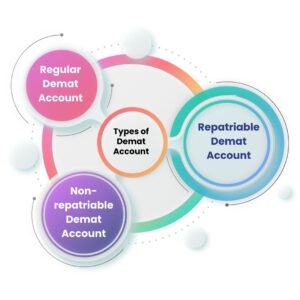
Demat Account- Meaning, Importance and Documents required
A Demat account, short for “Dematerialized Account,” is an account that holds securities and investments in an electronic or dematerialized form. It is the equivalent of a bank account but is used for holding and trading financial instruments such as stocks, bonds, government securities, and mutual funds in electronic format. A Demat account is required to deal in shares electronically. Securities are held in this account in an electronic format that has been dematerialized. An investor is unable to trade stocks on the stock market without a Demat account.
Importance of Demat Account:
- Maintain a record of every transaction.
- Minimize paperwork to facilitate easy liquidity.
- Facilitates transactions that are quicker and simpler.
- Provides a secure and safe place to store securities.
- Removes the possibility of certificates being altered/ faked/ lost/ damaged.
- Avoids delays in the securities transfer process.
Dematerialization of shares: Dematerialization of shares refers to the process of transferring financial products, such as stocks and bonds, from their physical certificates into an electronic or digital format. In the context of securities and investments, dematerialization involves eliminating the need for physical paper documents by representing ownership and transactions in a digital format.
Features of a Demat Account
Here are some essential elements to help you better grasp what a demat account means-
- Simple to Reach: Via net banking, it offers quick and simple access to all of your investments and statements.
- Simple Securities Dematerialization: All of your physical certificates can be converted to electronic form with the assistance of the depository participant (DP), and vice versa.
- Getting Dividends & Benefits on Stock: It takes advantage of simple and quick ways to get dividends, interest, and refunds. Everything is automatically credited to the account. Additionally, it updates investor accounts with stock splits, bonus issues, rights, public issues, etc. using the Electronic Clearing Service (ECS).
- Simple Share Transfers: The usage of a demat account has made share transfers considerably quicker and simpler.
- Share Liquidity: Selling shares has never been easier, faster, or more convenient thanks to Demat Accounts.
- Advance Against Securities: One can also apply for a loan against the securities held in their demat account after opening one.
- Demat Account Freezing: For a predetermined duration of time, one can freeze a specific type or number of securities in their demat account. This will eventually prevent funds from being sent into your account from any debit or credit card.
How Demat Account works
The specifics of the shares and other securities registered in your name are kept in a Demat Account. In order to buy and sell shares, a trading account must be opened. The availability of Trading Accounts with online trading capabilities by numerous banks and brokers facilitates the participation of regular investors in the stock market.
Types of Demat Account:

Regular Demat Account: It enables the electronic holding and trading of equity shares and other securities by investors. To participate in activities such as Futures and Options, a normal demat account needs to be connected to a trading account. The annual maintenance charge (AMC) associated with this account varies depending on the service provider. The Basic Services Demat Account (BSDA) was developed by SEBI in response to the demands of small investors. Depending on the size of the investment, it reduces or eliminates the AMC, making it more accessible for those with little holdings.
Repatriable Demat Account: The repatriable demat account, which is only intended for Non-Resident Indian (NRI) investors, enables them to make investments in the Indian stock market and makes it easier for them to transfer money outside of India. For the purpose of repatriation, NRI investors must link their NRE (Non-Resident External) accounts to the demat accounts. NRI investors can repatriate up to $1 million USD per year with this account. It also gives people who want to invest in India the freedom and convenience of having the option to send money elsewhere.
Non-repatriable Demat Account: The non-repatriable demat account is intended for non-resident Indians (NRIs), just like the repatriable demat account. It does not, however, allow the transfer of money outside of India. Rather, an NRO (Non-Resident Ordinary) account, where the money stays in India, is connected to the non-repatriable demat account. It enables non-resident Indians (NRIs) to keep their money inside the Indian financial system while participating in the country’s stock market and reaping the rewards of economic progress.
Documents Required to Open:
- Proof of Identity (PoI): Aadhaar Card, Passport, Voter ID, Driving License
- Proof of Address (PoA): Aadhaar Card, Passport, Voter ID, Driving License, Recent utility bills (electricity, water, gas), Bank statements.
- Passport Size Photographs: Two passport-size photographs are required.
- PAN Card: In order to open a Demat account, you must have a Permanent Account Number (PAN) card.
- Income Proof (for trading in derivatives): Salary slips, Income Tax Returns (ITR), Form 16.
- Bank Account Details: A canceled cheque or a copy of your bank statement with the account number and IFSC code.
KYC Documents: Know Your Customer (KYC) documents may include additional forms provided by the Depository Participant (DP) or the brokerage
How to use a Demat Account:
- Using your client ID or account number, access your online Demat account.
- All of your holdings, whether they be bonds, mutual funds, stocks, or securities, will be visible to you in your portfolio.
- To trade, you must obtain a trading account after opening a demat account.
- You must link your bank account, trading account, and Demat account after opening an account.
- Before you may begin trading after linking your accounts, you must submit an order request through your trading account. After that, your broker will put you in touch with a suitable trading platform so you may place your trade.
- The exchange will handle your order online.
- Depending on the transaction you complete, your Demat account will then be credited or debited, and you will receive a confirmation message via SMS and email.
